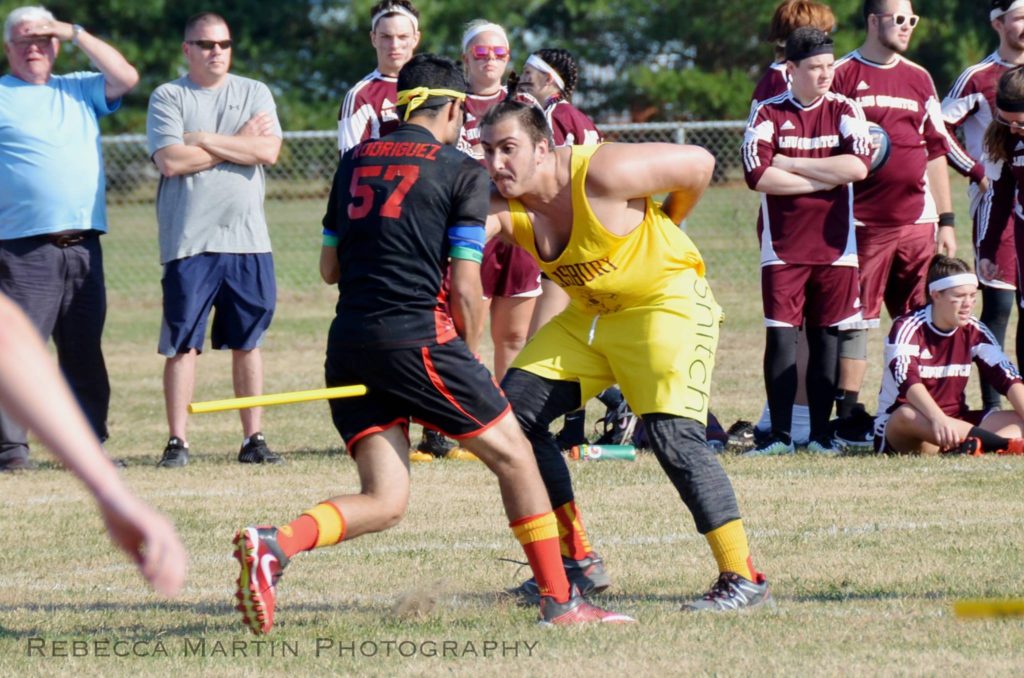Antwerp QC, Much of Belgian Core, Leaves Competitive Quidditch

Credit: Rebecca Martin
The bidding system USQ uses to select the teams for US Quidditch Cup 10 is massively flawed.
Teams play for as little as three months before having their hopes of a nationals berth crushed and the rest of their season becomes meaningless. This system is harshest on the teams bringing new players into our sport who have the potential to be great one day but barely have enough time to get into the sport for those early regional championships. Community teams, on the other hand, require less practice time to be competitive and experienced players let them snag a bid at regionals and then slack off until nationals, belittling the effort many teams put in each season.
In order to keep people interested, the onus has fallen on USQ members hosting tournaments to give teams something for which to play. If the tournaments go well then players can have fun, however, sometimes things fall apart and USQ swoops down and rules the efforts of member invalid, as was the case with this year’s Wolf Pack Classic. On the other side of the spectrum you have Consolation Cup, an event that gives non-qualifying teams a competitive national tournament to train for as an alternative US Quidditch Cup 10. For those unfamiliar, this tournament is set up as the quidditch equivalent of NCAA Basketball’s National Invitational Tournament, which many teams that miss the NCAA basketball tournament participate in. The first rendition of Consolation Cup was very well run and is a major boon to the sport. The hit or miss results of tournaments are a detriment to the quality assurance of the USQ brand exacerbated by the fact that for teams with early regional championship dates, these member-hosted tournaments are the only thing that give two-thirds of their season any meaning.
Honestly, the ideal situation would be for USQ to host their own equivalent of the NIT, but, due to very legitimate logistical reasons, this is an impossibility. Now we get to the good part though: rather than just acknowledge we have a problem, we can work to solve it with minimal effort. As of now, USQ allocates US Quidditch Cup 10 bids based on performance at regional tournaments, regional team density and team ability at US Quidditch Cup (did a team in your region make the Sweet 16?). But why?
Yes, most of the teams who are great will earn their bid during their regional, but some can miss it for want of one critical player not being able to put off a college paper, while others miss a chance at greatness because their new players were a month of training from being the best. In the end, the result is the same: the remaining months of their season become meaningless.
So change it.
Withhold a number of wild card bids that can be allocated later on and retain meaning for all the teams striving for greatness. These bids can be given by whatever means USQ chooses, though the following are the two methods I have in mind.
By Standings
Credit: USQ standings algorithm
The standings have been much derided in the past, but the reality is that they are actually a fairly accurate predictor of team performance at nationals. Despite this, they are only really used for forming pools for regional championships and US Quidditch Cup. Why waste a powerful statistical tool like that? Instead, let’s make it relevant.
After allocating bids at regionals, the remaining, non-qualified teams highest in the standings would be offered the remaining bids. This would make the regular season invaluable to a great number of teams and drive teams to play more competitively as there is always something on the line. To prevent anyone from just trying to pad the records of all their region’s teams, these wild cards could very easily be capped at just one per region.
By Vote

Credit: Enkie Photography
Some people don’t like math; for them, we offer a popular vote. Instead of an unfeeling algorithm, teams that would like to be considered for wild-card bids would submit their name and perhaps a 100-word argument for why their team deserves the bid. These would be put on a page, and each team would list which teams deserve the bids (accounting for the regional cap). Those with the most votes would be offered the bids. Voting criteria can include record, standings or even just most-fun team. This may not select the truly best team, but it would certainly ensure the teams that most people want to see at US Quidditch Cup get the chance to compete. The only challenge would be the deadline would probably fall shortly after the last regional, so basically every team from that regional should submit an application and only those who do not qualify get included in the voting options.
This is an issue USQ needs to care about, if not for the sake of the players hurt by the unfairness of the staggered regionals, the legitimacy of the sport seeing many great teams not get into nationals or the growth as new players lose interest, then for self interest. The sport has seen numerous governing bodies rise up, including the International Confederation of Broomstick Athletes, for those with a long memory, and the current incarnation of the IQA and MLQ. Some have failed, some are growing and, surely, some are yet to come. If USQ does not improve where it can, then someone will do it for them.
All that being said, USQ does a good job hosting events and governing with its limited resources, and we don’t want to strain those further with an NIT-type tournament just yet. However, there are easy ways to make the season outside of regionals and US Quidditch Cup mean something. Wild card bids based on standings or a popular vote would keep teams excited, keep players involved and keep games relevant before and after regional championships come to a close.
Archives by Month:
- April 2025
- May 2023
- April 2023
- April 2022
- January 2021
- October 2020
- September 2020
- July 2020
- May 2020
- April 2020
- March 2020
- February 2020
- January 2020
- December 2019
- November 2019
- October 2019
- August 2019
- April 2019
- March 2019
- February 2019
- January 2019
- November 2018
- October 2018
- September 2018
- August 2018
- July 2018
- June 2018
- April 2018
- March 2018
- February 2018
- January 2018
- November 2017
- October 2017
- July 2017
- June 2017
- May 2017
- April 2017
- March 2017
- February 2017
- January 2017
- December 2016
- November 2016
- October 2016
- September 2016
- August 2016
- July 2016
- June 2016
- May 2016
- April 2016
- March 2016
- February 2016
- January 2016
- December 2015
- November 2015
- October 2015
- September 2015
- August 2015
- July 2015
- June 2015
- May 2015
- April 2015
- March 2015
- February 2015
- January 2015
- December 2014
- November 2014
- October 2014
- September 2014
- August 2014
- July 2014
- May 2014
- April 2014
- March 2014
- February 2014
- January 2014
- November 2013
- October 2013
- September 2013
- August 2013
- July 2013
- June 2013
- May 2013
- April 2013
- March 2013
- February 2013
- January 2013
- December 2012
- November 2012
- October 2012
Archives by Subject:
- Categories
- Awards
- College/Community Split
- Column
- Community Teams
- Countdown to Columbia
- DIY
- Drills
- Elo Rankings
- Fantasy Fantasy Tournaments
- Game & Tournament Reports
- General
- History Of
- International
- IQA World Cup
- Major League Quidditch
- March Madness
- Matches of the Decade
- Monday Water Cooler
- News
- Positional Strategy
- Press Release
- Profiles
- Quidditch Australia
- Rankings Wrap-Up
- Referees
- Rock Hill Roll Call
- Rules and Policy
- Statistic
- Strategy
- Team Management
- Team USA
- The Pitch
- The Quidditch Lens
- Top 10 College
- Top 10 Community
- Top 20
- Uncategorized
- US Quarantine Cup
- US Quidditch Cup
